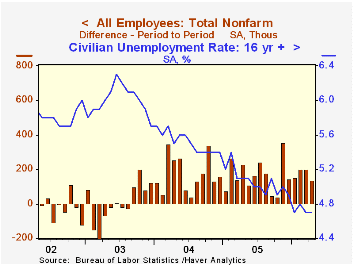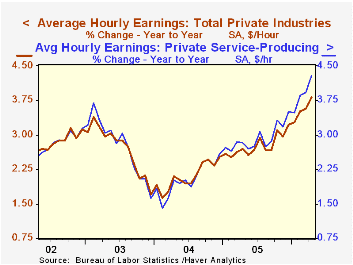 Global| May 05 2006
Global| May 05 2006U.S. Job Growth Slowed, Wage Inflation Accelerated
by:Tom Moeller
|in:Economy in Brief
Summary
Nonfarm payrolls rose just 138,000 last month and the March increase was revised down to 200,000. The April gain fell short of Consensus expectations for a 200,000 rise. Private sector jobs were up 131,000, thus undershooting the new [...]

Nonfarm payrolls rose just 138,000 last month and the March increase was revised down to 200,000. The April gain fell short of Consensus expectations for a 200,000 rise.
Private sector jobs were up 131,000, thus undershooting the new ADP indicator for this subset which was issued Wednesday and had projected a 178,000 gain. The difference of 47,000 is somewhat less than that implied in the Consensus figure, while government employment, with a 7,000 rise, grew less than its recent average.
The 0.5% gain in average hourly earnings exceeded the Consensus expectation for a 0.3% rise and followed an upwardly revised 0.3% March increase. Factory sector earnings accelerated to 0.3% (1.9% y/y) following four consecutive months of 0.1% gain while private service-producing wages rose 0.6% (4.3% y/y). Professional & business services wages jumped 0.9% (5.8% y/y) and finance, insurance & real estate earnings increased 0.7% (4.3% y/y).
From the household survey the unemployment rate matched Consensus expectations and held steady at 4.7%. Employment rose just 47,000 (1.8% y/y) after a 384,000 surge during March while the labor force rose 159,000 (1.3% y/y).
The decline in teen labor force participation from the Federal Reserve Bank of Chicago is available here. 
Payroll employment in private service-producing industries rose just 94,000 (1.7% y/y) last month following a downwardly revised 164,000 March rise. Jobs in retail trade reversed all of the prior month's increase with a 36,100 (+0.3% y/y) decline and job cutbacks were widespread. Financial sector jobs rose 26,000 (2.6% y/y) while professional & business services employment was similarly firm with a 28,000 (2.7% y/y) gain. Jobs in education & health rose 35,000 (2.4% y/y) while leisure & hospitality employment increased 20,000 (1.8% y/y).
Factory sector payrolls posted the best month of job gain in two years with a 19,000 April worker increase. Employment in the motor vehicles & parts industries rebounded 12,200 (-1.0% y/y) from earlier declines while computer & electronics payrolls rose 6,500 (0.9% y/y). However, the breadth of gain in factory payrolls over the last three months fell to 45.2% indicating broad based job loss.
Construction employment rose 10,000 (3.7% y/y) but government employment rose just 7,000 (0.6% y/y) following somewhat stronger gains during the prior two months.
"I always avoid prophesying beforehand because it is much better to prophesy after the event has already taken place." -- Winston Churchill
| Employment | April | Mar | Y/Y | 2005 | 2004 | 2003 |
|---|---|---|---|---|---|---|
| Payroll Employment | 138,000 | 200,000 | 1.5% | 1.5% | 1.1% | -0.3% |
| Manufacturing | 19,000 | 1,000 | -0.1% | -0.6% | -1.3% | -4.9% |
| Average Weekly Hours | 33.9 | 33.8 | 33.8 (April '05) | 33.8 | 33.7 | 33.7 |
| Average Hourly Earnings | 0.5% | 0.3% | 3.8% | 2.8% | 2.1% | 2.7% |
| Unemployment Rate | 4.7% | 4.7% | 5.1% (April '05) | 5.1% | 5.5% | 6.0% |
Tom Moeller
AuthorMore in Author Profile »Prior to joining Haver Analytics in 2000, Mr. Moeller worked as the Economist at Chancellor Capital Management from 1985 to 1999. There, he developed comprehensive economic forecasts and interpreted economic data for equity and fixed income portfolio managers. Also at Chancellor, Mr. Moeller worked as an equity analyst and was responsible for researching and rating companies in the economically sensitive automobile and housing industries for investment in Chancellor’s equity portfolio. Prior to joining Chancellor, Mr. Moeller was an Economist at Citibank from 1979 to 1984. He also analyzed pricing behavior in the metals industry for the Council on Wage and Price Stability in Washington, D.C. In 1999, Mr. Moeller received the award for most accurate forecast from the Forecasters' Club of New York. From 1990 to 1992 he was President of the New York Association for Business Economists. Mr. Moeller earned an M.B.A. in Finance from Fordham University, where he graduated in 1987. He holds a Bachelor of Arts in Economics from George Washington University.
More Economy in Brief
 Global| Feb 05 2026
Global| Feb 05 2026Charts of the Week: Balanced Policy, Resilient Data and AI Narratives
by:Andrew Cates






